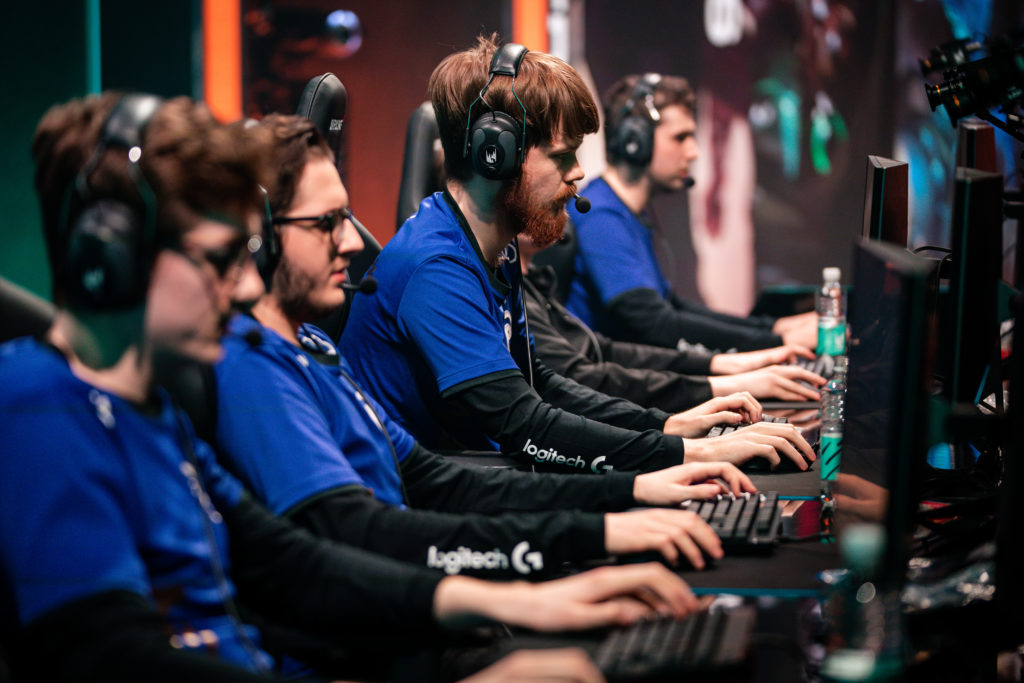Last week ESA hosted our latest #ESAwebinar, esports: building audiences during lockdown.
Hundreds of people from almost 30 countries tuned in. One great thing about lockdown is that more people can attend our live events. I also love the fact that now I can attend the same events as friends from all over the world, live. Speakers on other continents can take part who wouldn’t have been able to join. We’re connecting in new and interesting ways every day, including in how we engage with live sport.
Since esports is the topic of the week at ESA it’s my turn to offer my two cents. My first stumbling block is that I’m not an esports expert, so sharing my ‘thought leadership’ on the topic might turn out a little like the story of the emperor’s new clothes. That said, since one of my favourite mantras at work (to the point of being a bit irritating) is ‘solutions not problems’, I decided to take my own advice and enlisted the help of a friend who’s immersed in the world of gaming: Alban Dechelotte, Head of Sponsorship and Business Development EU Esport at Riot Games.

While I was preparing myself to bask in his borrowed glory, I started investigating the burning issues around esports. My list of questions to quiz Alban with quickly grew, but I also realised that there were a couple of key topics I knew a little about too, because esports is its own sport with a loyal community but it also intersects with many other sports and communities.
Something I’ve spent a long time thinking about is what makes great sport, both as a competition and content. As many of you will know, another issue close to my heart is how to create happy, open-minded, inclusive communities. So before I move onto Alban’s insights, let me share a couple of mine. (For clarification – as in every great story, this is the part where I build suspense, not the dull preamble while you wait for the action).
There’s a Zeitgeist around esports both because esports’ formula means it can co-exist with a state of lockdown, and because before anyone had ever heard of COVID-19, despite esports being over 45 years old, it had become the rising star of the 21st century sports world, rapidly growing year-on-year in popularity. However, it isn’t the confluence of these two facts that makes esports the right solution to live sport’s current troubles. esports is the right solution, because done well with a quality product, it’s really compelling and can give us a live sport fix.
That said, new esports should only be created where there is something original to offer the audience – as it true of any sport. If a ‘traditional’ sport moves online, it needs to feel like a virtual gathering true to the beating heart of that sport.
Simply put – you might be able to take the sport out of the real world, but you can’t take real world out of the sport. My point? I’ve said it before and I’m sure I’ll say it again (nothing like repeating yourself on a point that you already stole from Simon Sinek to get your readers going J) – we always have to start with why. Why are so many new esports being created? What’s the purpose?
Right so it’s clear I want purpose. That’s a handy segue (it’s almost like I have time to plan, edit and re-edit these blogs) into my personal purpose. For anyone who knows me, it’s hard to avoid my relentless efforts to encourage open-mindedness and inclusivity, and not because I’ve been told that’s the right thing to do (although my mother has been telling me that as far back as my memories go), but because it’s basic logic.
We’re all different. If we insist on judging people by which boxes they fit into, we’ll run out of boxes. To represent your audience, to represent people, you have to be inclusive, because audiences, like people, are naturally diverse. Why have I gone off at a seeming tangent about diversity in the middle of an esports blog post? Because it’s a topic that comes up time and again in discussions about all sports and recently in particular relating to esports.
My view, which comes from no credible source other than an open mind, is that if your purpose is timeless, then how you bring it to life offline or online will be inclusive. Tokenism may allow some box ticking in the short-term, but we need to think about building loyal, lasting relationships with our communities and these come through a communal purpose and understanding. (I’m incredibly tempted to break off into how Shakespeare nailed this over 400 years ago, but I’m going to resist this once. Enjoy it while it lasts…)
Okay enough of my ruminations; on with the main event!
Here’s what Alban had to say (I found it fascinating):
1. What impact on esports have you seen so far from the COVID-19 crisis, cancellation of live outdoor sports events and widespread international lockdown?
League of Legends Esports was one of the first sports impacted, since our Chinese league (the LPL) had to suspend their show in January. They later transitioned into a remote show with players competing from their gaming performance facilities without an audience. As we saw the outbreak reach Europe, we’ve taken a lot of measures to adapt to the rapidly evolving situation. We cancelled our Spring Finals in Budapest and moved them to our Berlin studio without live audience or media access. When we received the news that one of our staffers might have contracted the virus, we then cancelled the show and in under a week transitioned completely to a remote setup – creating an online network across 30 Berlin apartments to re-create the capabilities we have in our multi-million dollar studio setup. I imagine that’s how the Apollo 13 crew felt when they had to recall the rocket using some basic materials. Since then, our competition has continued and we are approaching the final of our Play-offs for the Spring Season.
2. Are you seeing new audience groups taking an interest in esports or just larger numbers of the same demographics as before?
Our sport is very particular in that almost all our fans played League of Legends prior to discovering the game’s European Championships. For us, this means that our audience hasn’t gone through a complete makeover like Formula 1 Esports. We believe that the new players who have discovered the game since the outbreak will stimulate long-term growth for the sport. This has directly translated into more people tuning into our broadcast – we’ve just recorded our fifth semester of double-digit growth in viewership, with the Average Minute Audience growing by 10% on last year’s so far this Spring Season.
3. Are certain esports growing more quickly than others eg sports-based vs CS:GO?
In the last ten years we have seen top-tier esports, like League of Legends and CS:GO, stabilising and gaining ground. The gaming industry is very dynamic with new releases happening every month, but it is very difficult to build an ecosystem that is sustainable for more than a few years at the top. Initial quick gains in popularity or viewership don’t necessarily translate into continuous growth, like that we’ve seen for the past decade with these two top titles. Naturally, there will be spikes in viewership and attention for certain titles – we saw that happen with a few in 2018 and 2019 – but the true longevity, and thus long-term success lies in building the community from the ground up, catering to them and working around them to create a valuable, sustainable ecosystem.
4. What will happen to esports when the full roster of live sport is back on TV and in stadia?
Riot was founded by passionate gamers and inspired by traditional sports to build one of the world’s fastest-growing sports in the last 10 years. We welcome traditional sports involvement that is thoughtful and adds to our scene overall, but we don’t see them as the biggest competitor for League of Legends. Fans who discovered esports when sports went dark, needed to find other ways to consume and engage with the content they love and I think it’s likely that the consumption of competition through live streaming will have broadened esports’ reach.
5. What do you think the lasting impact of the current crisis will be on esports?
I think that the real win here is that more fans have discovered League of Legends, and will continue to tune in. So the lasting impact will probably be the number of new players for our games, who represent the potential growth of our sport in the future.

Katie Traxton is an ESA Board Director and Chief Communications Officer at Formula E. She was previously Managing Partner at WeAreFearless, ESA’s Pan-Europe Sponsorship Agency of the Year.

